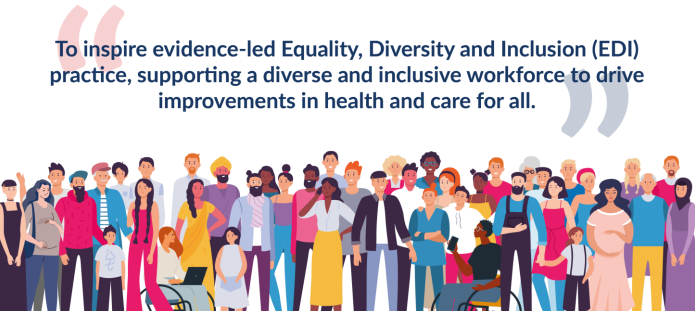
Executive Summary
Equality, Diversity, and Inclusion (EDI) is at the heart of everything we do across the National Institute for Health and Care Research (NIHR) Manchester Biomedical Research Centre (BRC) and NIHR Manchester Clinical Research Facility (CRF).
We recognise the value of a diverse and inclusive workforce and how it leads to greater creativity, advances in our research and, ultimately, to better outcomes for our patients and the communities we serve.
Research changes, improves and saves lives. This joint EDI Strategy (2022 – 27) is our commitment to building more inclusive and effective research, delivered by diverse workforces developed across both Manchester BRC and Manchester CRF, which will drive forward even more improvements in health and care and lasting change for our population.
By bringing together our skills and people, and by building on the strong foundations of EDI across Manchester BRC’s and Manchester CRF’s partner organisations, we know we can achieve greater progress to deliver our vision to provide personalised health and care for all.

Our Strategy

People: Foster a culture within the BRC and CRF that prides itself on its commitment to proactive inclusion
Process: Create processes and practice that enable the BRC and CRF workforce and student population to thrive
Education and training: Ensure training and development opportunities are accessible and attractive to all.
Legacy: Bring evidence-led EDI into the spotlight in the BRC and CRF infrastructure; to leave a footprint of positive and impactful change for our workforce, research participants and communities.
Our four perspectives are areas of focus identified across both our BRC and CRF partner organisations. This EDI Strategy aims to create improvements within each perspective, using a series of objectives that will be delivered in the short, medium and long-term.
Our Objectives and Implementation
Under People, our short, medium and long-term objectives are:
- Embed proactive inclusion in BRC and CRF culture.
- Understand the demographics of our people.
- Ensure communications are inclusive for all.
Under Process, our short, medium and long-term objectives are:
- Ensure EDI is embedded in our standard processes.
- Ensure recruitment, retention and progression of BRC and CRF workforce and students is equitable.
- Develop and maintain an evidence-led EDI case study library.
Under Education and Training, our short, medium and long-term objectives are:
- Ensure fair and equitable access to opportunities to build capacity in experimental medicine.
- Develop an EDI training offer that supports our EDI ambitions.
- Ensure the process to access all types of training is fair and equitable.
Under Legacy, our short, medium and long-term objectives are:
- Prioritise collaborative working.
- Ensure inclusive access to funding and support.
- Embed and promote EDI projects into the BRC and CRF.
Our Impact
We will ensure this strategy is regularly updated in line with any feedback from our stakeholders and learning as we deliver our objectives. Progress of our EDI strategy will be continually reviewed through our inclusive research infrastructure and governance structures.
We will continually measure the impact of our strategy across our four perspectives: People, Process, Education and Training, and Legacy.
Our Commitment
Manchester BRC and Manchester CRF infrastructures are committed to delivering, reflecting on, and continually evolving this strategy to create a more equal, diverse and inclusive research environment.
As a result, our workforce will feel confident and comfortable in their place of work and will display attitudes and behaviours that are truly inclusive. Career progression will be fair and equitable, with diversity across all roles.
Our diverse workforce and student population will represent our communities, leading to improved access to research opportunities for participants and patients.
Our EDI strategy will lead to a richer, more innovative and inclusive research environment, that meets the needs and improves the outcomes of the populations we serve.
This strategy is closely aligned to the BRC and CRF’s joint Patient and Public Involvement, Engagement and Participation Strategy, alongside our education and training programs.
Our strategy also relates to the five themes that the NIHR EDI Strategy (2022 – 2027) centres around.
To read the full strategy, please click here to download a pdf version.
*The foreword of this EDI Strategy was published in October 2023 when Professor Ian Bruce was the Director of the NIHR Manchester BRC. Professor Anne Barton was appointed Director in April 2024.
